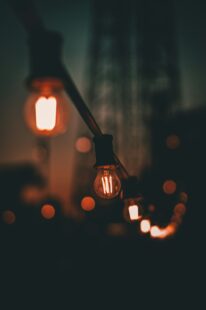What to Do with Nighttime Anxiety
Dr. Aryn Ziehnert
Holidays and family celebrations can be joyous for some and heavy-laden for others. For many people, spending time with family during the holidays is an occasion for joy and celebration, while for others it is burdened with darker meanings, unwanted memories, and all the complexities of family dynamics.
 In the same way, daily tasks and routines can affect people differently. Some people enjoy nighttime because it means the end of a workday and being able to reset. For others, dusk is filled with dread and unpleasantness. Nighttime anxiety is a real struggle for many people. Understanding nighttime anxiety and the help that is available for it can make a significant difference in a person’s life.
In the same way, daily tasks and routines can affect people differently. Some people enjoy nighttime because it means the end of a workday and being able to reset. For others, dusk is filled with dread and unpleasantness. Nighttime anxiety is a real struggle for many people. Understanding nighttime anxiety and the help that is available for it can make a significant difference in a person’s life.
The causes of nighttime anxiety
For some people, what causes anxiety at night is the time of day itself. The dark is where things go bump in the night, and for a person who worries about every noise that they hear in the dark, it can be nerve-wracking. In most other cases, however, nighttime anxiety is not a distinct kind of anxiety. The reasons behind anxiety during the day are the same as at night. It is just that the slowing that comes with evening allows more time to think about them.
The causes of anxiety are varied. These are the general causes of anxiety, that also contribute to nighttime anxiety. It can include genetics, as some people have a genetic susceptibility to anxiety, and they have family members who have anxiety too. Likewise, environment and experiences can contribute. If you live in a situation with anxious people who model anxious behaviors, it is possible to take on and learn some of those behaviors.
Stressful life experiences and situations can also bring about anxiety. This includes experiencing trauma and having a history of trauma.
Interestingly, certain medications and herbal supplements can contribute to developing anxiety, as they affect your brain and body’s chemistry. This can alter how you respond to stressful situations. The same is true for certain medical conditions that can trigger anxiety, such as diabetes, certain brain tumors, heart disease, chronic pain, hyperthyroidism, and irritable bowel syndrome (IBS).
Regarding nighttime anxiety specifically, it is best described as anxiety that is already there, but that is more noticeable at night. That is to say that nighttime anxiety is not a separate kind of anxiety, but it refers to anxiety that is heightened or surfaced at nighttime.
Nighttime can heighten anxiety for a variety of reasons. With sleep come dreams, and nightmares can trigger nighttime anxiety. Your diet, what you eat or drink, affects you in significant ways. For example, if you consume caffeine during the day, it can make a person less able to sleep during the night, as well as anxious and jittery as well.
The night is usually quiet and there are fewer distractions than during the day. This may mean that at night you have more opportunities to dwell on the things that make you anxious. Specifically, you are sometimes more aware of our aches and pains when we are falling asleep, and that can raise concerns about our health and the possible implications of poor health.
Fear about the coming day can lead to nighttime anxiety. If looming in the day ahead is a big meeting, an exam, a date, or a conversation that may significantly alter a relationship the following day, being anxious can inhibit sleep. If you are then anxious about your struggles or even the ability to sleep, it can sabotage it. Sleep deprivation exacerbates anxiety. In a sort of vicious cycle, sleep deprivation itself can also trigger nighttime anxiety.
 Look out for these signs of nighttime anxiety
Look out for these signs of nighttime anxiety
Some of the signs of nighttime anxiety include the following:
- Nightmares.
- Heart palpitations.
- Sweating.
- Having difficulty breathing and feeling lightheaded.
- Upset stomach.
- Panic attacks, where you may feel dread or like you are out of control.
- Uncontrolled thoughts.
- Aches and pains such as jaw pain, chest tightness, and headaches.
- Ruminating, which is when you fixate on upsetting or worrying thoughts like a recent argument, financial concerns, or reliving a trauma.
If you experience these symptoms, talk to a doctor so that they can examine you and determine the underlying cause. A medical professional can rule out certain possibilities so that you get the help you need.
Nighttime anxiety affects you by making your mind race and making it difficult to stop your thoughts. This can make getting to sleep difficult, and poor sleep has some negative effects on your mental, emotional, and physical health, as it is the body’s way of resetting, healing, and processing the previous day while preparing you for the next.
Restoring peaceful nights – help for nighttime anxiety
We all have anxiety from time to time without it significantly affecting our overall health. Occasional anxiety is common especially when you are feeling stressed or under pressure. However, when anxiety persists, has not responded to meaningful self-care, affects your daily functioning, or causes health problems, you need to get help. Chronic anxiety does not get better on its own, and delaying treatment may only serve to exacerbate the situation.
Some of the ways that you can reduce nighttime anxiety include some home remedies or implementing better self-care. This may look like the following:
 Reducing your caffeine intake
Reducing your caffeine intake
Try to avoid caffeine during the day, and especially before bed, as it can worsen the symptoms of anxiety. It may also be helpful to avoid alcohol close to bedtime, as alcohol can also disrupt sleep.
Putting away the electronics
This is part of developing better sleep hygiene. There is some research that indicates that the blue light from electronics makes it harder to fall and stay asleep by suppressing the sleep hormone melatonin.
Making use of relaxation techniques
You can relieve the symptoms of anxiety through relaxation techniques such as progressive muscle relaxation, box breathing, deep breathing, guided meditation, or 4-7-8 breathing. Massage, a regular self-care routine to reduce stress buildup, meditation, and mindfulness can all help to ground you in the present and reduce the impact of your anxiety symptoms.
Making dietary changes
In addition to changing what you drink, it is important to take note of foods that affect you and your ability to sleep easily, or that make you anxious. For instance, if eating fatty or sugary foods makes you anxious about your health or your weight, avoiding them or reducing them can help alleviate nighttime anxiety symptoms you may experience.
Other dietary changes you can make include trying herbal supplements such as ginseng, saffron, kava, or lavender, which may help in reducing anxiety. Speak with your doctor before you try supplements, not only to avoid any negative drug interactions but also because the Food and Drug Administration (FDA) does not regulate the purity or quality of supplements.
Taking in regular exercise
Regular exercise can relieve stress and ease the symptoms of anxiety and depression.
Managing your stress
Adopting strategies to help you manage daily stress can have a positive effect on your nighttime anxiety. Implementing strategies, such as deepening your time management skills, getting help with household chores, finding professional help to manage your finances, or strengthening your workplace boundaries, can reduce your stress levels and may help ease nighttime anxiety.
 Developing a sleep schedule
Developing a sleep schedule
The other part of sleep hygiene is having a sleep schedule. This includes going to bed and waking up at the same time, making sure your room is dark and cool enough to let you sleep comfortably, clearing your mind of the day’s concerns before bed by journaling, and so on. This will give you a fighting chance at a good night’s rest.
These home remedies may effectively reduce your anxiety. However, additional support is also required. The good news is that it is possible to find the right treatment approach for your anxiety. Some of the available options include talk therapy, and it may also require taking antianxiety medications. For others, sleeping pills may help reduce restlessness at night, but you should talk with your doctor about taking them.
If nighttime is an anxious time for you, know that there is help available. Please reach out to us and we will set you up with a Christian counselor who can help you better understand your nighttime anxiety and provide you with tools to cope effectively with it.
“Starry Sky”, Courtesy of guille pozzi, Unsplash.com, CC0 License; “Light String”, Courtesy of Biel Morro, Unsplash.com, CC0 License; “Pencil and Journal”, Courtesy of Jan Kahánek, Unsplash.com, CC0 License; “Sunset”, Courtesy of dominik hofbauer, Unsplash.com, CC0 License







